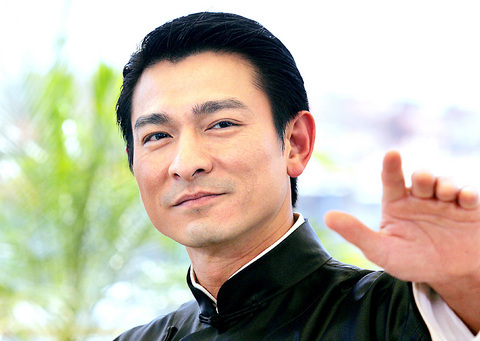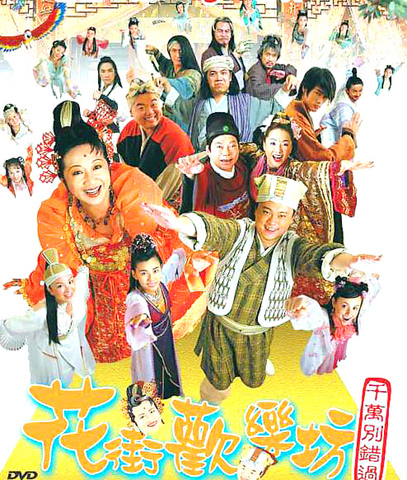This week's only Asian movie whch is being released is Where is Mama's Boy (花街歡樂坊), starring William Hung (孔慶祥), in a role tailor-made for him. The Hong Kong-made costume comedy takes advantage of Hung's comedic talent in the hopes that it will generate box office success.
Hung was a UC Berkeley student who made his name after an audition on US TV show American Idol. His not-so-sexy performance of Ricky Martin's She Bang received harsh comments from the judges but unexpected laughter from TV viewers, and Hung has been widely popular ever since.
Where is Mama's Boy also has many faces familiar to Hong Kong comedies including Wong Yu-fat (黃一飛) from Shaolin Soccer; Lam Tze-chung (林子聰), the chubby partner of Stephen Chow (周星馳) in Kung Fu Hustle; as well as Nancy Sit (薛家燕).

PHOTO: AFP
Hung, famous for his singing and clumsy dance steps, no doubt will perform a few songs in this pseudo-musical, pseudo-martial-arts comedy.
The story of Where is Mama's Boy revolves around a red-light district in south China during the Ming dynasty. Foon Inn is the most famous bar and brothel in the area and draws enough customers -- even from noble families -- to pack the place every night.
Hung plays a happy vender selling clay-oven buns. He does not like to visit the Foon Inn, but he helps the madam and her ladies when it is suddenly closed down by gangsters. After all the vanity is washed away, the women realize the truth of happiness and began to appreciate the beauty of simple lives.

PHOTO COURTESY OF SHENGCHI INTL MEDIA
In other film news, Hong Kong star Andy Lau (劉德華) and his Focus Films (映藝娛樂) last Wednesday announced plans to produce a pack of six Chinese-language projects by up-and-coming filmmakers from across Asia in Hong Kong, Taiwan, China, Malaysia and Singapore.
It is the first time that such a project has been initiated in the region. Each feature film will be produced in high-definition technology and will be shot in its home market using a local cast and production network.
Calling the project Focus First Cuts, Andy Lau said the project is to cultivate a new generation of filmmakers in Asia.
"Besides producing big commercial film projects, we also want to cultivate new filmmakers by arranging the necessary resources and support to realize their potential and reach out to a wider audience," Lau said last Wednesday at Hong Kong Filmart, an Asian film and TV trade show.
Lau said the budget of all six features is planned to be HK$25 million (NT$101 million), with each film estimated to cost about HK$6 million (NT$24 million), which is considered low for Hong Kong filmmaking.
Robin Lee (李芸蟬) represents Taiwan with a film tentatively called Ren Yu Duo Duo (人魚朵朵), a fairy tale about a girl's relationship with shoes. Lee attracted Lau's attention at the 2004 Golden Horse Awards (金馬獎), when Lau saw Magic Washing Machine (神奇洗衣機) and was intrigued by the urban fantasy story, Lee's first short feature, which won Best Short Film.
Also benefiting from the project are Hong Kong's Lam Tze-chung, the Kung Fu Hustle comedian; Wong Ching-po (黃精甫) and Lee Kung-lok (李公樂), who directed the Andy Lau vehicle Jiang Hu (江湖) and the acclaimed indie drama Fubo (福伯); Malaysia's Ho Yuhang (何宇恆); and Singapore's Kevin Tong (唐永健). The Chinese project is yet to be announced.
Star Chinese Movies Network (衛視電影台), a satellite broadcaster under the STAR group, has the rights to exclusive television premieres and broadcasts of the six Chinese-language projects in Asia, except in Japan, South Korea and Thailand.

That US assistance was a model for Taiwan’s spectacular development success was early recognized by policymakers and analysts. In a report to the US Congress for the fiscal year 1962, former President John F. Kennedy noted Taiwan’s “rapid economic growth,” was “producing a substantial net gain in living.” Kennedy had a stake in Taiwan’s achievements and the US’ official development assistance (ODA) in general: In September 1961, his entreaty to make the 1960s a “decade of development,” and an accompanying proposal for dedicated legislation to this end, had been formalized by congressional passage of the Foreign Assistance Act. Two

Despite the intense sunshine, we were hardly breaking a sweat as we cruised along the flat, dedicated bike lane, well protected from the heat by a canopy of trees. The electric assist on the bikes likely made a difference, too. Far removed from the bustle and noise of the Taichung traffic, we admired the serene rural scenery, making our way over rivers, alongside rice paddies and through pear orchards. Our route for the day covered two bike paths that connect in Fengyuan District (豐原) and are best done together. The Hou-Feng Bike Path (后豐鐵馬道) runs southward from Houli District (后里) while the

March 31 to April 6 On May 13, 1950, National Taiwan University Hospital otolaryngologist Su You-peng (蘇友鵬) was summoned to the director’s office. He thought someone had complained about him practicing the violin at night, but when he entered the room, he knew something was terribly wrong. He saw several burly men who appeared to be government secret agents, and three other resident doctors: internist Hsu Chiang (許強), dermatologist Hu Pao-chen (胡寶珍) and ophthalmologist Hu Hsin-lin (胡鑫麟). They were handcuffed, herded onto two jeeps and taken to the Secrecy Bureau (保密局) for questioning. Su was still in his doctor’s robes at

Mirror mirror on the wall, what’s the fairest Disney live-action remake of them all? Wait, mirror. Hold on a second. Maybe choosing from the likes of Alice in Wonderland (2010), Mulan (2020) and The Lion King (2019) isn’t such a good idea. Mirror, on second thought, what’s on Netflix? Even the most devoted fans would have to acknowledge that these have not been the most illustrious illustrations of Disney magic. At their best (Pete’s Dragon? Cinderella?) they breathe life into old classics that could use a little updating. At their worst, well, blue Will Smith. Given the rapacious rate of remakes in modern